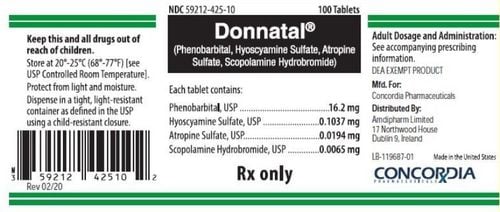This is an automatically translated article.
The article was written by MSc Mai Vien Phuong - Gastroenterologist, Department of Medical Examination & Internal Medicine - Vinmec Central Park International General HospitalInflammatory bowel disease is a chronic inflammation of the intestines due to a variety of physical causes. Irritable bowel syndrome (HCRKT) is a common disorder that affects the large intestine (colon). This syndrome often causes cramping, abdominal pain, bloating, flatulence, diarrhea, and constipation. HCRKT is a chronic condition that requires long-term management.
Although bothersome signs and symptoms are present, unlike ulcerative colitis and Crohn's disease, which are forms of inflammatory bowel disease, HCRKT does not alter bowel tissue or increase the risk of colorectal cancer.
Only a small number of people with irritable bowel syndrome have severe signs and symptoms. Some people can manage their symptoms by adjusting their diet, lifestyle, and managing stress. Others will need medication and counseling.
These two diseases, with similar clinical symptoms, are easy to confuse, but the treatment and prognosis are completely different.
1. Differentiation based on clinical symptoms
Signs and symptoms of irritable bowel syndrome and inflammatory bowel disease can vary from person to person and often resemble other conditions. Common signs and symptoms are:Abdominal pain or cramping Feeling of bloating Bloating Diarrhea or constipation – sometimes alternating episodes of constipation and diarrhea Mucus in the stool For most In most cases, GERD is a chronic condition, although signs and symptoms sometimes worsen and sometimes improve or even disappear. In terms of digestive symptoms, it is difficult to distinguish the two forms. . However, bloody stools, weight loss, and sores in the mouth and anus are more often associated with inflammatory bowel disease.
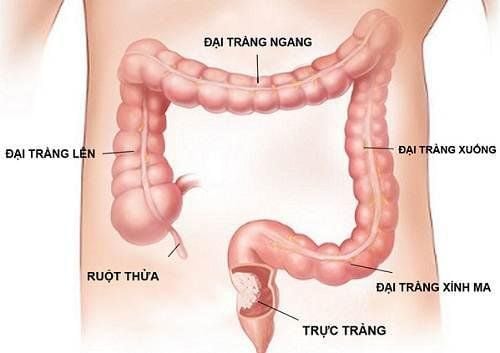
Customers can refer to:
>>> Identifying irritable bowel syndrome - distinguishing from digestive diseases
2. Causes of Irritable Bowel Syndrome
The cause of Irritable Bowel Syndrome is still unknown, but it can be caused by many factors. The intestinal wall is lined with layers of muscles that contract and relax rhythmically during the passage of food from the stomach through the intestines to the rectum.
When you have irritable bowel syndrome, the contractions can be stronger and last longer than usual, causing gas, bloating, and diarrhea. Conversely, when the intestines contract weakly, the movement of food will be slow, causing the stool to become hard and dry.
Abnormalities of the nervous system in the digestive tract can also cause you to feel more uncomfortable than usual when your abdomen is bloated or full of stools.
Poor coordination between brain and gut signals can cause your body to overreact to changes that normally occur in the digestive process. This overreaction can cause pain, diarrhea, or constipation. Regardless of the cause, in patients with irritable bowel syndrome, there is no physical damage to the intestines
For inflammatory bowel disease, which includes two forms of ulcerative colitis and Crohn's disease, both of which All had physical damage to the intestines. This disease involves an abnormal immune response that causes excessive inflammation. It usually affects the walls of the intestine, especially the lower part of the small intestine (ileum) and segments of the colon.
Customers can refer to:
>>> Stress can trigger irritable bowel syndrome
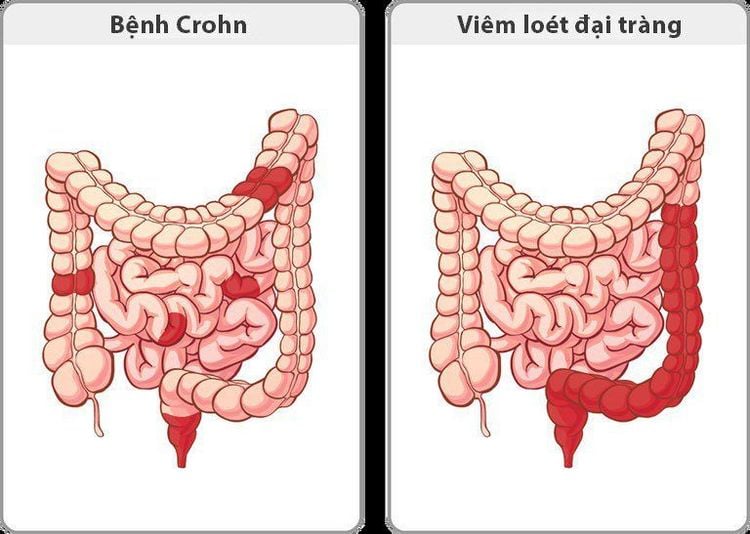
3. Predisposing factors for irritable bowel syndrome
For irritable bowel syndrome, triggers that may not affect one person but cause symptoms in people with Irritable Bowel Syndrome – not everyone with the syndrome responds with the same trigger. Possible triggers include:
Food : the relationship between a food allergy or intolerance to irritable bowel syndrome is unknown, however many people have had severe symptoms. after eating certain foods. The foods involved are chocolate, spices, fats, fruits, legumes, cabbage, broccoli, broccoli, milk, carbonated drinks and alcohol; Stress: most people with ACS may find their signs and symptoms worse or more frequent during periods of high stress, like the last week or the first week at a new job. However, stress can only aggravate symptoms, not cause symptoms; Hormones: Women are more than twice as likely to suffer from HCC, researchers suggest that hormonal changes play a role in causing this syndrome. Many women notice signs and symptoms get worse during or before/after their period; Other conditions: Sometimes other medical conditions, such as an episode of acute infectious diarrhea (gastroenteritis) or bacterial overgrowth in the intestinal tract (dysbacteriosis) can trigger IBD. For inflammatory bowel disease, the following predisposing factors may be present:
Family history . There is a high risk if you have a close relative, such as a brother, parent or child, with the disease. Use isotretinoin (Accutane). Isotretinoin (Accutane) is a medication that is sometimes used to treat acne scars that are cystic or have not responded to other treatment. Although causality has not been proven, studies have reported the development of inflammatory bowel disease with isotretinoin use. Non-steroidal anti-inflammatory drugs. Although these drugs - ibuprofen (Advil, Motrin, others), naproxen (Aleve), diclofenac (Cataflam, Voltaren), piroxicam (Feldene and others) - have not been confirmed to cause ulcerative colitis, can cause similar signs and symptoms. In addition, these drugs can make existing ulcerative colitis worse, and may make the initial diagnosis more difficult. Smoke. This is the most important factor that can be controlled. Smoking also makes the disease worse and increases the risk of surgery. If you are a smoker, the most important thing is to stop smoking.

4. Diagnosing Irritable Bowel Syndrome
Since there is no physical evidence to definitively diagnose HCC, the diagnosis is a process of excluding other conditions. To aid in this process, researchers have developed two sets of criteria for diagnosing GERD and other gastrointestinal dysfunction – this is a condition in which the intestines are normal but functioning. ) abnormal. Both sets of criteria are based on symptoms after excluding other conditions.
Rome Criteria: according to these criteria, you must have certain signs and symptoms before being diagnosed with irritable bowel syndrome by a doctor. The most important symptom is abdominal pain and discomfort that persists for at least 3 days/month and for the past three months, combined with two or more of the following symptoms: increased frequency of bowel movements, change in frequency of bowel movements. stool yield or change in stool consistency. Manning Criteria: These criteria focus on pain relief after bowel movements, sensation of incomplete bowel movements, mucus in stools, and changes in stool consistency. The more symptoms you have, the more likely you are to have ACS. Your doctor will evaluate what criteria you meet, as well as evaluate if you have any other signs or symptoms that indicate you have a more serious medical condition. Some alarming signs and symptoms that suggest additional testing include:
Onset after age 50; Weight loss; Rectal bleeding; Fever; Recurrent nausea or vomiting; Abdominal pain, especially pain that does not go away completely after a bowel movement, or occurs at night; Diarrhea that persists or wakes you up; Iron deficiency anemia. If you don't have any of the warning signs or symptoms listed above, your doctor may recommend a treatment regimen without performing additional testing. However, if you do not respond to this treatment, additional tests may be required.
For inflammatory bowel disease, in addition to relying on clinical symptoms, colonoscopy is a mandatory procedure, because there are typical endoscopic images of ulcerative colitis or Crohn's disease, with imaging inflammation, edema, hemorrhage, pseudomembranous, ulcers, gastrointestinal fistula, ... in the wall of the gastrointestinal tract, at the same time, the doctor will take a small sample of the intestinal wall to consider under the microscope (Tissue testing for pathology. study) to see the inflammatory nature of the gastrointestinal tract.
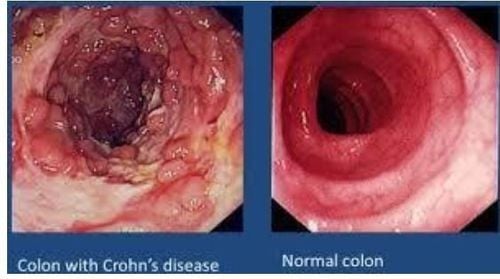
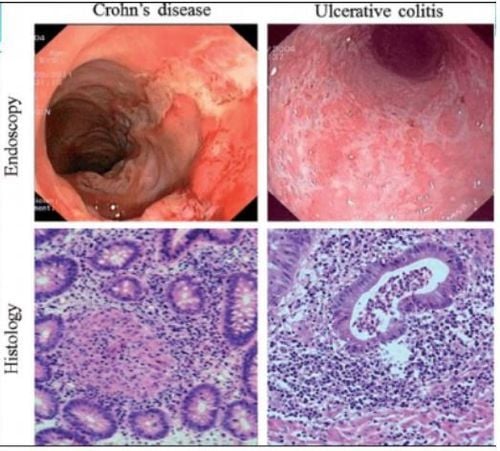
In summary, a patient with a bowel disorder needs to be fully consulted and examined with a specialist, given appropriate tests to be able to diagnose and treat appropriately.
Another important thing is that colonic tumors also have similar signs, before diagnosing a patient with irritable bowel syndrome, all of these conditions should be ruled out.
At Vinmec Hospital, the diagnosis through colonoscopy with Olympus CV 190 endoscope, with NBI function (Narrow Banding Imaging - endoscopy with narrow light frequency band) gives analytical image results. mucosal pathology is more obvious than conventional colonoscopy, detecting ulcerative lesions in the colon.
Please dial HOTLINE for more information or register for an appointment HERE. Download MyVinmec app to make appointments faster and to manage your bookings easily.










